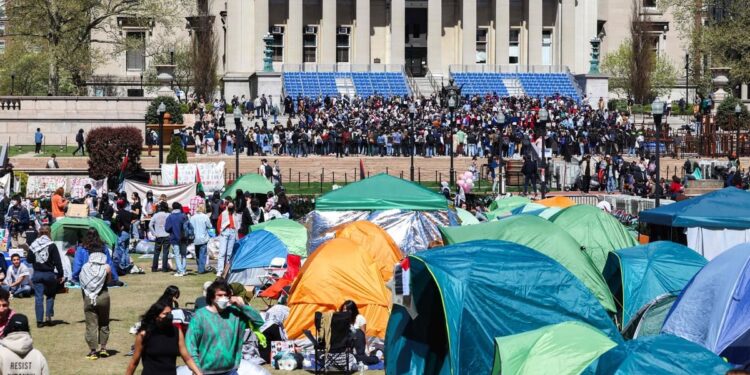The prestigious New York University Columbia decided to carry out all its courses remotely on Monday, while pro-Palestinian demonstrations continue on campus, its president announced.
• Read also: Jewish students asked to leave university
• Read also: Around a hundred pro-Palestinian demonstrators arrested at Columbia University in New York
• Read also: Accused of anti-Semitism, American Columbia University defends itself before Congress
“We need to put things back in order,” university president Nemat Shafik said in a statement to students, asking those who do not live on campus not to get there.
Tensions have continued to increase since Thursday, when around a hundred demonstrators protesting against the war waged by Israel in Gaza were arrested by the police.
But dozens of students continued to demonstrate on campus, notably setting up tents there to avoid being dislodged.
AFP
They demand, among other things, that the university, which has an exchange program with Tel Aviv, boycott all activities linked to Israel.
“There has been a big debate about whether or not to mobilize the police,” Nemat Shafik said in the press release, with police forces only able to intervene on the campus, private property, with the agreement of the University.
AFP
“No form of violence will be tolerated. Material damage, whatever it may be. Any form of crime. And that includes harassment, threats, (…) or anything else of that nature,” Mike Gerber, the head of legal affairs for the New York police, said at a press conference on Monday.
AFP
With pro-Palestinian flags or signs in hand, hundreds of other students demonstrated Monday on campuses across the country in support of the demonstrators at Columbia University.
“We are here to relentlessly condemn the ongoing genocide of Palestinians in Gaza and the ethnic cleansing that has lasted for more than 75 years,” Rayan Amim, 19, a student at Emerson College, told AFP. from Boston.
At least 47 people were arrested at Yale University, north of New York, during a rally, according to American media.
AFP
Since the start of the conflict between Israel and Hamas, American campuses have been the scene of tensions and voices have been raised to denounce a rise in anti-Semitism.
The Republicans took up the subject and after a heated hearing in Congress, the president of the University of Pennsylvania Elizabeth Magill, then her Harvard counterpart Claudine Gay resigned, in December and January respectively.
On Sunday, US President Joe Biden said anti-Semitism has “no place” on campus.



